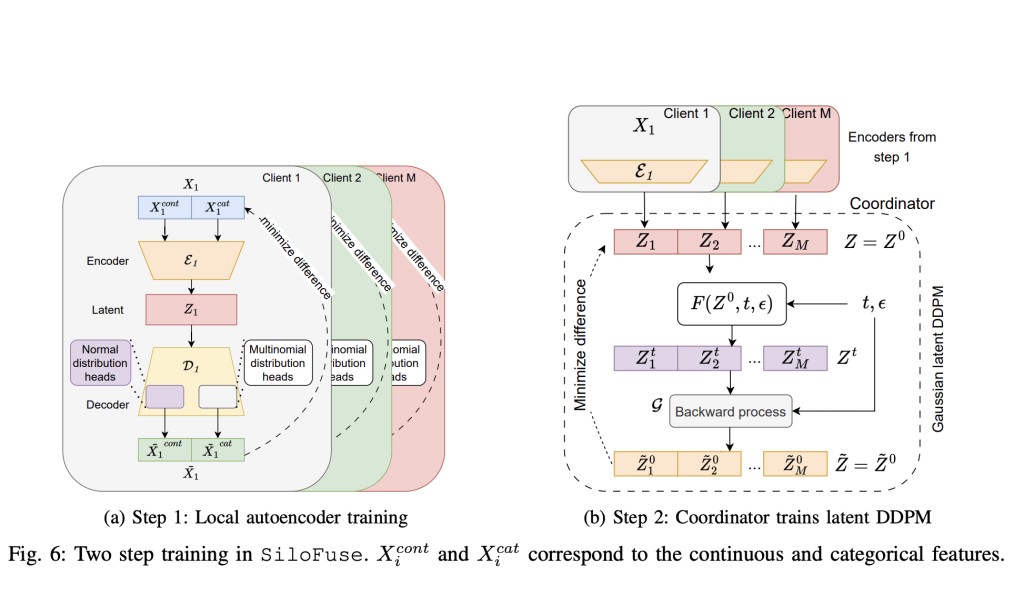In an era when data is as valuable as currency, many industries face the challenge of sharing and augmenting data across various entities without breaching privacy norms. Synthetic data generation allows organizations to circumvent privacy hurdles and unlock the potential for collaborative innovation. This is particularly relevant in distributed systems, where data is not centralized but scattered across multiple locations, each with its privacy and security protocols.
Researchers from TU Delft, BlueGen.ai, and the University of Neuchatel introduced SiloFuse in search of a method that can seamlessly generate synthetic data in a fragmented landscape. Unlike traditional techniques that struggle with distributed datasets, SiloFuse introduces a groundbreaking framework that synthesizes high-quality tabular data from siloed sources without compromising privacy. The method leverages a distributed latent tabular diffusion architecture, ingeniously combining autoencoders with a stacked training paradigm to navigate the complexities of cross-silo data synthesis.
SiloFuse employs a technique where autoencoders learn latent representations of each client’s data, effectively masking the true values. This ensures that sensitive data remains on-premise, thereby upholding privacy. A significant advantage of SiloFuse is its communication efficiency. The framework drastically reduces the need for frequent data exchanges between clients by utilizing stacked training, minimizing the communication overhead typically associated with distributed data processing. Experimental results testify to SiloFuse’s efficacy, showcasing its ability to outperform centralized synthesizers regarding data resemblance and utility by significant margins. For instance, SiloFuse achieved up to 43.8% higher resemblance scores and 29.8% better utility scores than traditional Generative Adversarial Networks (GANs) across various datasets.
SiloFuse addresses the paramount concern of privacy in synthetic data generation. The framework’s architecture ensures that reconstructing original data from synthetic samples is practically impossible, offering robust privacy guarantees. Through extensive testing, including attacks designed to quantify privacy risks, SiloFuse demonstrated superior performance, reinforcing its position as a secure method for synthetic data generation in distributed settings.
Research Snapshot
In conclusion, SiloFuse addresses a critical challenge in synthetic data generation within distributed systems, presenting a groundbreaking solution that bridges the gap between data privacy and utility. By ingeniously integrating distributed latent tabular diffusion with autoencoders and a stacked training approach, SiloFuse surpasses traditional efficiency and data fidelity methods and sets a new standard for privacy preservation. The remarkable outcomes of its application, highlighted by significant improvements in resemblance and utility scores, alongside robust defenses against data reconstruction, underscore SiloFuse’s potential to redefine collaborative data analytics in privacy-sensitive environments.
Check out the Paper. All credit for this research goes to the researchers of this project. Also, don’t forget to follow us on Twitter. Join our Telegram Channel, Discord Channel, and LinkedIn Group.
If you like our work, you will love our newsletter..
Don’t Forget to join our 39k+ ML SubReddit
The post SiloFuse: Transforming Synthetic Data Generation in Distributed Systems with Enhanced Privacy, Efficiency, and Data Utility appeared first on MarkTechPost.
Source: Read MoreÂ

